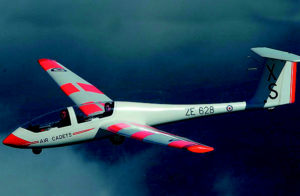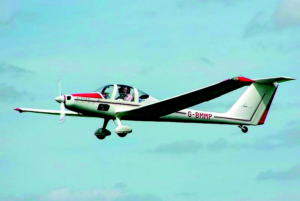 The Air Cadet organisation has announced a significant restructuring of its Air Cadet Volunteer Gliding Squadrons (VGS). All 146 of the VGS Viking gliders and Vigilant motor gliders have been grounded since Easter 2014 and even now there is no certain date for the fleet to return to service.
The Air Cadet organisation has announced a significant restructuring of its Air Cadet Volunteer Gliding Squadrons (VGS). All 146 of the VGS Viking gliders and Vigilant motor gliders have been grounded since Easter 2014 and even now there is no certain date for the fleet to return to service.
The RAF Air Cadets is a UK-based, RAF-sponsored organisation with just under 40,000 members aged between 12 and 20 years. It is made up of the Air Training Corps which has around 900 squadrons based in communities around the UK and just under 33,000 cadets, and the Combined Cadet Force (RAF) which is made up of cadets from all three military services, based in approximately 200 independent and state schools across the country. The Air Cadets say that around 40% of RAF officers and 50% of all RAF aircrew (including pilots, navigators and engineers) are ex-cadets.
Flying opportunities in gliders, motor gliders and powered aircraft has always been an important part of the experience and training offered to air cadets. In 2011 the Air Cadets achieved just under 1,400 first solos. The target for 2014, before the grounding order, was around 2000 flying scholarships and 1,600 first solos. Meantime, the number of Air Training Corps cadets has fallen by around 8% over the last four years, although how much of this decline is a result of the reduced flying activity is not known.
The Air Cadet’s fleet of Viking gliders and Vigilant motor gliders was grounded in 2014 when an investigation uncovered serious deficiencies in the airworthiness records for the Viking and Vigilant aircraft. Further investigation revealed underlying serviceability problems on the aircraft themselves including unrecorded and unauthorised maintenance and poor quality repairs. The problems were sufficiently widespread for the entire fleet to be grounded. Ever since, efforts have been ongoing to devise a scheme to bring the aircraft back into service (involving a refresh from origin of every aircraft’s airworthiness certificate and a re-baseline of all maintenance records), although this project is being hampered by the number of organisations and sub-contractors involved, some of whom have little or no experience of operating gliders and motor gliders. It is now been decided that the best ‘value for money’ solution is to bring at least 73 Vikings back to service, together with up to 15 Vigilants (although the Vigilants will be phased out of service by 2019). The Air Cadets say that additionally there will be an increase in Grob Tutor fixed wing Air Experience Flights (AEFs).
The number of Grob Tutor aircraft for AEF / University Air Squadron (UAS) use will go from 45 to 70 beyond 2017, allowing the enlargement of existing AEFs and the formation of two new AEFs. FTN understands that three Vikings and five Vigilants have so far been returned to the air at RAF Syerston after remedial work, and have received very favourable reports from their test pilots. However, doubts remain over the rate of progress in bringing other aircraft back to airworthy standard, with the current ‘production’ rate believed to be in the order of one airframe per month.
 As part of the restructuring of the VGS system, a number of VGS units will be disbanded (see side bar) and a number of regional gliding hubs are to be created. The Air Cadets say that they also expect that two new Air Experience Flights will be created (13 AEF and 14 AEF). Although the locations of these new AEFs have not been announced, it is expected that 14 AEF will be located in Northern Ireland. The Air Cadets says that it will develop a ‘crossover plan’ under which Vigilant instructors who meet the minimum flying skills and experience will be offered a transfer to the Tutor. They also say that the RAF remains committed to Air Cadet flying and will ultimately increase investment in the VGS and AEF sites which remain, to include the provision of residential accommodation for cadets and staff. Commandant Air Cadets, Air Commodore Dawn McCafferty said, “Everyone from CAS [Chief of the Air Staff – Ed] down did their very best to maintain as much cadet flying as possible. To be absolutely clear, less gliding does not mean less flying, indeed, there will be more flying opportunities available. Therefore, we will need to make the very best of the situation and I look forward to joining as many of you as possible on the journey to a different but still air-minded cadet experience.”
As part of the restructuring of the VGS system, a number of VGS units will be disbanded (see side bar) and a number of regional gliding hubs are to be created. The Air Cadets say that they also expect that two new Air Experience Flights will be created (13 AEF and 14 AEF). Although the locations of these new AEFs have not been announced, it is expected that 14 AEF will be located in Northern Ireland. The Air Cadets says that it will develop a ‘crossover plan’ under which Vigilant instructors who meet the minimum flying skills and experience will be offered a transfer to the Tutor. They also say that the RAF remains committed to Air Cadet flying and will ultimately increase investment in the VGS and AEF sites which remain, to include the provision of residential accommodation for cadets and staff. Commandant Air Cadets, Air Commodore Dawn McCafferty said, “Everyone from CAS [Chief of the Air Staff – Ed] down did their very best to maintain as much cadet flying as possible. To be absolutely clear, less gliding does not mean less flying, indeed, there will be more flying opportunities available. Therefore, we will need to make the very best of the situation and I look forward to joining as many of you as possible on the journey to a different but still air-minded cadet experience.”







